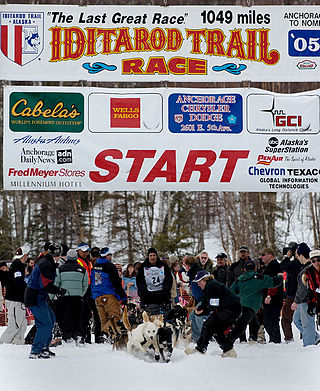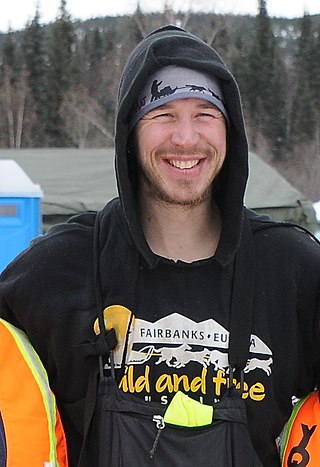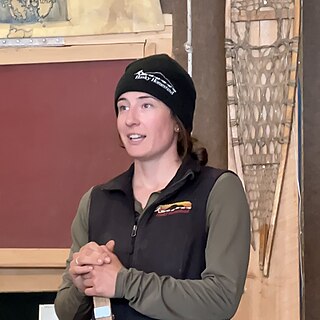
The Iditarod Trail Sled Dog Race, more commonly known as The Iditarod, is an annual long-distance sled dog race held in Alaska in early March. It travels from Anchorage to Nome. Mushers and a team of between 12 and 16 dogs, of which at least 5 must be on the towline at the finish line, cover the distance in 8–15 days or more. The Iditarod began in 1973 as an event to test the best sled dog mushers and teams but evolved into today's highly competitive race.

The Yukon Quest, formally the Yukon Quest 1,000-mile International Sled Dog Race, is a sled dog race scheduled every February since 1984 between Fairbanks, Alaska, and Whitehorse, Yukon, switching directions each year. Because of the harsh winter conditions, difficult trail, and the limited support that competitors are allowed, it is considered the "most difficult sled dog race in the world", or even the "toughest race in the world"—"even tougher, more selective and less attention-seeking than the Iditarod Trail Sled Dog Race." The originator envisioned it as "a race so rugged that only purists would participate."

The ceremonial start of the 33rd annual Iditarod Trail Sled Dog Race across the US state of Alaska began in Anchorage on March 5, 2005, at 10 am AKST, and restarted in Willow the next day at 2 pm. After covering 1,161 miles (1,868 km) of wilderness, musher Robert Sørlie, an airport firefighter from Norway, crossed the finish line under the "burled arch" in Nome on March 16 at 8:39 am AKST. After taking care of his dogs, and an inspection to make sure all the mandatory equipment was in his sled, Sørlie was declared the winner by Race Marshal Mark Norman, with a time of 9 days, 18 hours, 39 minutes, and 31 seconds and won US$72,066.67 and a new truck. When asked how it felt to win a second time, Sørlie said "it feels good, I'm ready for breakfast." His team of dogs averaged 4.65 mi/h (7.58 km/h). The Red Lantern in last was Phil Morgan, an Alaska Airlines pilot, and when he crossed the finish line on March 21 at 8:02 pm AKST, the Widow's Lantern hanging on the burled arch was extinguished, which signaled the end of the race.
The Junior Iditarod Sled Dog Race, or Jr. Iditarod, is a 148- to 158-mile sled dog race for mushers between the ages of 14 through 17, which is patterned after the 1,150-mile Iditarod Trail Sled Dog Race that is said to be 1,049 miles (1,688.2 km). The race is held outside Anchorage in the U.S. state of Alaska, and was the first long-distance race for juvenile mushers.

DeeDee Ann Jonrowe is an American kennel owner and dog musher who is a three-time runner up in the Iditarod Trail Sled Dog Race. She is a very popular figure in the sport, and her completion of the 1,049-mile+ race in 2003 just three weeks after completing chemotherapy for breast cancer received widespread publicity.
Emmitt Peters Sr. the "Yukon Fox", was an Alaskan American hunter, fisher, trapper, and dog musher. The last rookie to win the 1,049 mile Iditarod Trail Sled Dog Race, he and his lead dogs Nugget and Digger shattered the previous speed record by almost six days.
The ceremonial start of the 34th annual (XXXIV) Iditarod Trail Sled Dog Race across the U.S. state of Alaska began amidst the crowds of Anchorage on March 4, 2006, and the start of the competitive race, or "restart", began the next day in Willow. The race followed a modified version of the northern route for 1,151 mi (1,852 km) across the Alaska Range, through the sparsely inhabited Interior, along the Yukon River, and then up the coast of the Bering Sea to the city of Nome. Unlike in previous years, where the teams had to deal with unseasonably warm temperatures and soft, mushy snow, the weather was cold, with temperatures reported as low as −40 °F (−40 °C).

Ramy "Ray" Brooks is an Alaska Native kennel owner and operator, motivational speaker, and dog musher who specializes in long-distance races. He is a two-time runner up in the 1,049+ mi Iditarod Trail Sled Dog Race across the U.S. state of Alaska, and a former winner of the 1,000 mi (1,600 km) Yukon Quest dog sled race across both Canada and the U.S.

John Quniaq Baker is a self-employed American dog musher, pilot and motivational speaker of Inupiaq descent who once consistently placed in the top 10 during the long distance Iditarod Trail Sled Dog Race. Baker won the 2011 Iditarod with a finish time of 8 Days 19 Hours 46 Minutes 39 Seconds.

The ceremonial start of the 35th annual Iditarod Trail Sled Dog Race across the U.S. state of Alaska began amidst the crowds of Anchorage at 10 am (AKST) on March 3, 2007, and the start of the competitive race, or "restart", began at 2 pm the next day in Willow. The race followed the southern route for 1,151 mi (1,852 km) across the Alaska Range, through the sparsely inhabited Interior, along the Yukon River, and then up the coast of the Bering Sea to the city of Nome.

Lance Mackey was an American dog musher and dog sled racer from Fairbanks, Alaska. Mackey was a four-time winner of both the 1,000-mile (1,600 km) Yukon Quest and the Iditarod Trail Sled Dog Race.
The Alpirod is a defunct 1,000 kilometres (621 mi) sled dog stage race in Southern Europe. Its name comes from a combination of the Alps, where the race took place, and the Iditarod Trail Sled Dog Race, upon which the race was based. The competition consisted of a 14-day stage race in 11 cities in four countries: Italy, Germany, Austria and France. The competition consisted of multiple short races separated by evening breaks, similar to cycling's Tour de France. At the time, it was the largest sled dog race outside North America. The race was organized by Armen Khatchikian, an Italian Iditarod competitor who hoped to bring a form of that race to Europe. It first took place in 1988, and the inaugural race was won by Alaska racer Joe Runyan. In 1989, the race was won by Kathy Swenson. She was the first woman to win the race. In 1990, Alaskan Roxy Wright Champaine won the race, becoming the third American winner. In 1992, the race was won by Nenana, Alaska musher Jacques Philip, who went on to win the race three times.

Dallas Seavey is an American dog musher, and is the only musher to win the Iditarod Trail Sled Dog Race across the U.S. state of Alaska six times: in 2012, 2014, 2015, 2016, 2021, and 2024. In 2011, Seavey competed in and won the Yukon Quest sled dog race. In 2018 and 2019, Seavey also competed in Europe's longest sled dog race, Norway's Finnmarksløpet.

Aliy Zirkle is an American champion of sled dog racing.

Brent Sass is an American dog musher who is one of only six people to have won both the Iditarod and Yukon Quest sled dog races.

The 2019 Iditarod is the 47th iteration of the Iditarod Trail Sled Dog Race held in Alaska. The race began on March 2, 2019, in Anchorage, Alaska, and ended on March 18, 2019, in Nome, Alaska.
The 2020 Iditarod is the 48th iteration of the Iditarod Trail Sled Dog Race in Alaska. The race began on Saturday, March 7, 2020, in Anchorage, Alaska and was won by Thomas Waerner on March 18, in Nome. There was 58 mushers signed up to participate, including former champions and noted racers Robert Bundtzen, Martin Buser, Peter Kaiser, Lance Mackey, Nicolas Petit, Mitch Seavey, Joar Leifseth Ulsom, and Aliy Zirkle. The race started before Alaska's first coronavirus case on March 13, and after that incident, checkpoints were relocated or eliminated and gathering in Nome for the finish was discouraged.

The 2021 Iditarod was the 49th edition of the Iditarod Trail Sled Dog Race in Alaska. The race began on Sunday, March 7, 2021, in Anchorage, Alaska. 46 mushers participated in the race including past winners and noted racers Aliy Zirkle, Martin Buser, Dallas Seavey, Peter Kaiser, Joar Leifseth Ulsom, and Nicolas Petit.

The 2022 Iditarod was the 50th running of the annual dog sled race. The competition began on March 5 with its ceremonial start in Anchorage. All mushers were required to be vaccinated for COVID-19.

Amanda Otto is an American musher and sled dog racer. In 2022, she made her rookie run with a team of Alaskan huskies in the Iditarod, and in 2023, placed second in the Yukon Quest, where she was cited by race organizers and race veterinarians, in a rare unanimous decision, for exemplary treatment of her dogs.















